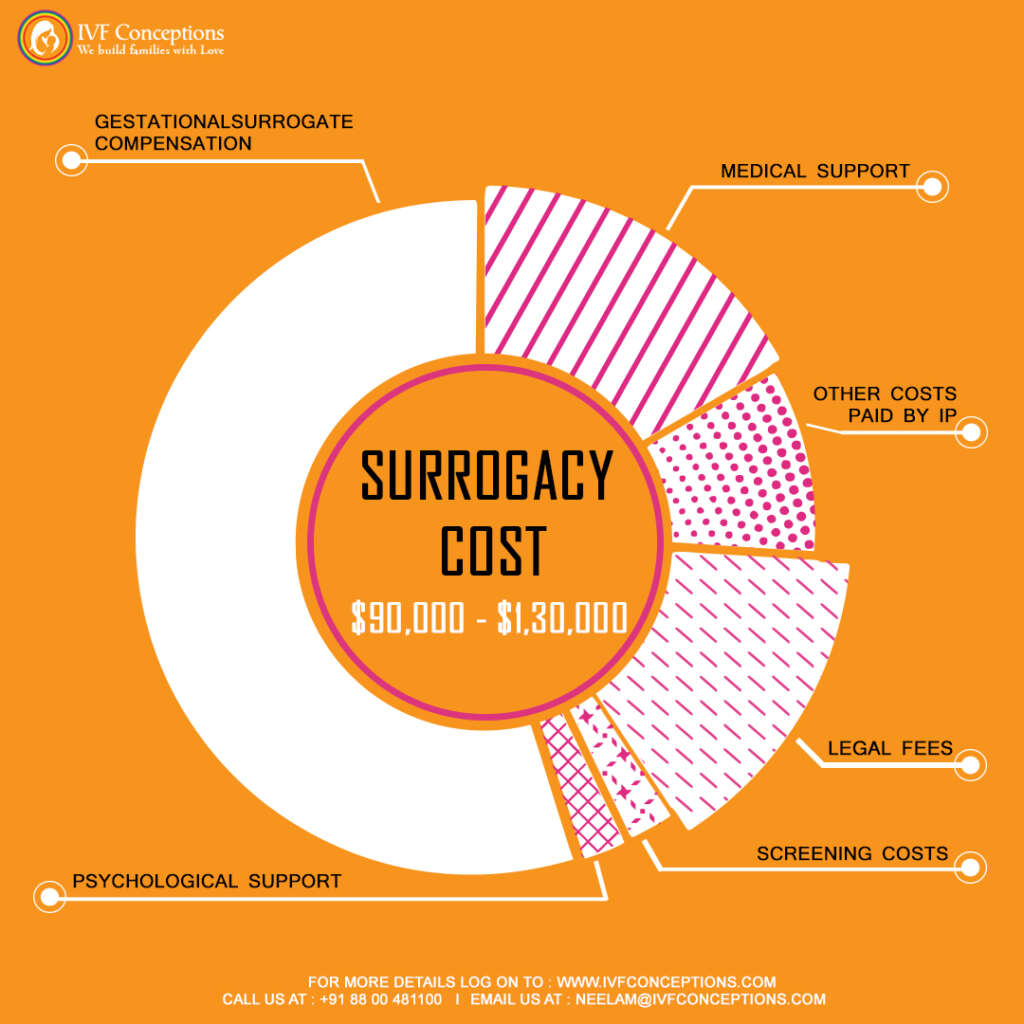How Much Do Surrogates Make – A Comprehensive Guide
Thinking about becoming a surrogate mother? The journey to parenthood can be tough and costly. But, it offers rewarding pay for those who choose surrogacy. How much money do surrogates make? We’ll explore this and more about surrogate mother pay.
- Book an online appointment: Get a free online consultation.
- Call\W:+91-8800481100 Email:neelam@ivfconceptions.com
Good news, being a gestational carrier costs no money. It does require time, effort, and emotional strength. This role connects intended parents with carriers without surrogates bearing costs. Agencies ensure everything needed for a smooth journey is provided.
Additional Resources to Read:
What are the Requirements of Surrogacy
How to find Surrogate Mother in Colombia
Key Takeaways
- Surrogate compensation can range from $50,000 to over $70,000, depending on various factors.
- The surrogate’s location and cost of living can influence their earning potential, with those in high-cost areas like California potentially earning more.
- Second-time surrogates often earn higher compensation due to their previous experience and the reduced likelihood of complications.
- Surrogates can receive financial reimbursements for expenses related to the surrogacy process, such as medical procedures and travel costs.
- The emotional fulfillment and personal growth gained from the surrogacy journey can be just as valuable as the financial rewards.
Understanding Surrogate Compensation

Starting the surrogacy journey in Georgia is both fulfilling and intricate, especially when we talk about the money matters. If you’re thinking of becoming a surrogate, it’s really important to know what to expect in terms of pay and the reasons behind it.
Surrogate compensation refers to the payment or benefits provided to a woman who agrees to carry a pregnancy for intended parents through surrogacy. The compensation amount and structure can vary significantly depending on the location, the type of surrogacy arrangement, and the specific terms agreed upon by all parties involved.
There are a few different approaches to surrogate compensation:
- Compensation for Reasonable Expenses: In some cases, surrogates are only compensated for reasonable expenses related to the pregnancy, such as medical costs, travel expenses, and lost wages due to bed rest or recovery. This approach is often referred to as “altruistic” or “non-commercial” surrogacy.
- Fixed Base Compensation: Many surrogacy arrangements involve a fixed base compensation amount paid to the surrogate, typically ranging from $20,000 to $40,000 or more in the United States. This compensation is intended to cover the surrogate’s time, effort, and potential risks associated with the pregnancy.
- Multiples Compensation: Additional compensation may be provided to the surrogate if the pregnancy involves multiple fetuses, as this increases the physical demands and potential risks.
- Other Benefits: In addition to monetary compensation, surrogates may receive other benefits, such as health insurance coverage, counseling services, or additional compensation for specific circumstances (e.g., cesarean delivery, lost reproductive organs, etc.).
Here’s a table summarizing common components of surrogate compensation:
| Compensation Component | Description |
|---|---|
| Reasonable Expenses | Medical costs, travel, lost wages due to bed rest/recovery |
| Fixed Base Compensation | Typical range of $50,000 – $70,000+ in the US |
| Multiples Compensation | Additional payment for carrying multiple fetuses |
| Health Insurance | Coverage for medical expenses related to pregnancy |
| Counseling Services | Psychological support and counseling for the surrogate |
| Special Circumstances | Additional compensation for events like cesarean delivery, lost reproductive organs, etc. |
It’s crucial to note that compensation structures and amounts can vary significantly depending on the location, legal framework, and specific surrogacy arrangement. In some countries, commercial surrogacy (where the surrogate receives compensation beyond reasonable expenses) is prohibited, and only altruistic surrogacy is permitted.
Intended parents and surrogates should work closely with experienced Surrogacy professionals in Georgia, such as surrogacy agencies and legal counsel, to ensure that the compensation structure is fair, ethical, and compliant with applicable laws and regulations.
Breakdown of Surrogacy Costs for Intended Parents

The expenses for parents wanting to start a family through surrogacy can reach over $100,000. This large sum covers everything needed to ensure the safety of everyone involved. Costs include fertility tests and treatments, in-vitro fertilization (IVF), egg donation, the surrogate’s pay, and more.
Parents also pay for the surrogate’s health insurance, agency and legal fees, and the delivery. If there are issues like the surrogate carrying more than one baby, extra costs might come up. But remember, the surrogate herself is not in charge of these expenses.
Factors Influencing Surrogate Compensation
A surrogate’s pay is determined by several things. Where she lives, her experience, the kind of medical treatments she needs, and how much support she’ll need all play a role. This ensures that both the surrogate and the parents are treated fairly.
Surrogate Compensation Package
The surrogate compensation is made to cover costs and pay you fairly for your time. It’s carefully planned to help with your well-being and safety during the journey.
Base Pay and Payment Structure
You will get money for times before, during, and after the pregnancy. You’ll receive pre-pregnancy payments of $4,000 in three parts before the embryo transfer. Then, pregnancy payments, starting once you confirm the baby’s heartbeat, come monthly in 8 parts. By 32 weeks of pregnancy, you’ll have received all of it. Lastly, there’s a post-pregnancy payment of $3,000 after the baby is born.
Additional Compensation for Medical Procedures
For medical work, you will get more than just the base pay. You’ll be compensated for tests, treatments, and medications beyond just the basic costs. This extra pay is to make sure you are properly thanked for the health help you provide.
Reimbursements and Provisions
Your package also has extra money for certain costs you have. This includes:
- Mileage and travel costs to medical visits
- Help with childcare and housekeeping while you’re pregnant
- Money for missing work because of medical needs
- Food delivery or vitamins, if needed
The Best Surrogacy agency aims to keep you financially safe during the surrogacy. This helps you pay attention to your health and the baby’s.
How much do Surrogates Make

How much a surrogate earns depends on many things. This includes where they live and their experience. Earnings from surrogacy are high but vary depending on these factors.
- First-Time Surrogate Compensation
First-time surrogates Mothers often earn from $50,000 to $90,000. This money reflects their time, care, and the hard work pregnancy brings. It helps them support the parents who dream of having a child.
- Second-Time Surrogate Compensation
Those who have been surrogates before might earn a bit more. Their compensation usually ranges from $60,000 to $119,000. Because they have previous experience, they might find the process easier and earn more.
- Location and Cost of Living Factors
Where a surrogate lives is also important. For example, in places like California, where living is expensive, surrogates might earn more. This is compared to areas like the Midwest where the cost of living is lower.
- Benefits of Being a Surrogate
Becoming a surrogate is not just about money. It also brings rich personal and emotional joys. You’ll find your role having a big, positive effect on the lives of others. This journey will also lead to your own significant growth.
- Financial Advantages
Being a surrogate means you can earn a good income. You are also making a big difference for parents who deeply want a child. This money might help you reach your own life goals. These could be getting rid of debts, saving money for the future, or a special project with your family.
- Emotional Fulfillment
Choosing surrogacy brings a lot of happiness, for yourself and for parents who can’t wait to have a baby. The joy and sense of purpose are priceless. Many surrogates say they feel close to the families they help. The love and thankfulness they get in return are very fulfilling.
- Personal Growth and Development
Being a surrogate can change you in many positive ways. You will learn a lot about the power of your body and spirit. This journey can make you more caring and understanding. It might change your life, both personally and in your work.
Additional Resources To Read:
Surrogacy for LGBT Couples: Your Path to Parenthood
Cheapest Countries for Gay Surrogacy
Best Countries for Surrogacy in 2024
Conclusion
Being a surrogate is a big decision that can change your life. It allows you to help build a family and you’ll also receive pay. Surrogates earn between $50,000 and $100,000 plus, depending on where you live and if you’ve done it before.
The joy of giving others the gift of family is immense. It brings meaning and achievement that lasts beyond the birth. If you’re thinking about becoming a surrogate, know it can be truly fulfilling. Both newcomers and those who’ve done it before find deep rewards in this work.
There are a lot of things to think about before making a choice. Think about what matters most to you, like financial needs and personal growth. Becoming a surrogate can change your life and the lives of the families you help. Embrace the chance to make a difference and feel the power of your kindness..
If you’d like to learn more about IVF, Egg Donation, or surrogacy services globally, check out the rest of our website at Georgia Surrogacy Agency. We offer legally secure and affordable surrogacy consulting services for FREE.
Our team has over 14 years of experience facilitating surrogacy arrangements, egg donation, and serving as an advocacy resource for infertile couples and LGBTQ individuals seeking to build families.
For more resources on IVF and Surrogacy, browse our other web page- IVF Conceptions.
For more resources on IVF and Surrogacy, browse our other web page- Complete Surrogacy.
FAQ FOR How Much Do Surrogates Make
How much do surrogates make?
First-time surrogates can make $50,000 to $70,000. Second-time surrogates might earn $60,000 to $110,000. This depends on where they live and the local cost of living.
What is the surrogate compensation package?
The package includes a base pay. It’s split into pre-pregnancy, pregnancy, and post-pregnancy payments. Pre-pregnancy payments are $4,000, paid in three parts before embryo transfer.
The pregnancy payments are monthly, starting after the second heartbeat confirmation. They’re paid in eight parts and fully received by 32 weeks. There’s also a post-pregnancy payment of $3,000.
What additional compensation do surrogates receive?
Surrogates get money for medical stuff and surrogacy costs. These include tests, IVF, insurance, and giving birth. The intended parents pay for all of this.
What factors influence surrogate compensation?
Where the surrogate lives and the costs of living matter. Those in places like California might make more. Also, second-time surrogates often earn more due to experience and fewer risks.
What are the benefits of being a surrogate?
Financial reward is a key benefit. Yet, the emotional and personal gains are big too. Surrogates help others become parents, which feels rewarding.
Also, the journey helps them grow. They deal with the challenges of pregnancy and the joy of bringing a child into the world.
Source Links
- https://www.conceiveabilities.com/surrogates/surrogate-mother-pay/
- https://www.americansurrogacy.com/surrogate/surrogates-surrogate-pay
- https://simplestepsfertility.com/2023/12/15/exploring-the-cost-of-surrogacy-a-comprehensive-guide-for-interested-surrogates/

Highly esteemed, authoritative, and trusted professional with a 14-year of experience in international surrogacy. Advocate for Secure, Legal, and Affordable International Surrogacy.
Neelam Chhagani, MA (Counselling Psychology) and Holistic Infertility and Third-Party Reproduction Consultant.
Member of European Fertility Society, Best Surrogacy Blogger of 2020, with 300 dedicated blogs, and top contributor on Quora for Surrogacy.


Add Your Comment